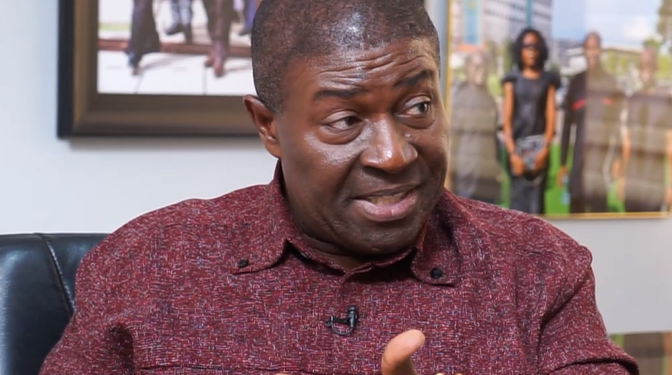Former National Communications Director of the New Patriotic Party (NPP), Nana Akomea, has strongly refuted comments made by Kennedy Ohene Agyapong during a recent speech in Mampong, describing several of his claims as inaccurate and misleading.
Mr. Agyapong, a former Member of Parliament for Assin Central and one-time presidential aspirant, addressed NPP members in Mampong as part of his early mobilization efforts ahead of the party’s 2028 presidential primaries.
In his speech, he urged party faithful to be wary of selecting leaders based solely on popularity without performance, arguing that electoral results must guide future leadership choices.
“Let no one be deceived,” Agyapong stated. “Our party has a history of rewarding strong candidates. If you lead us into an election and perform abysmally, you should not expect another chance.”
He also claimed the NPP had never given a second chance to a flagbearer who failed to perform, using the example of Prof. Adu Boahen. “In 1992, Prof. Adu Boahen, despite being a hero of our democratic struggle, was not given another opportunity after losing that election,” Agyapong said, contrasting that with the cases of former President John Agyekum Kufuor and President Nana Addo Dankwa Akufo-Addo, who both received second chances after strong performances.
“Kufuor campaigned for barely a few months in 1996 and still made a remarkable impact. That performance earned him the trust of the party to try again in 2000—and he won. Nana Addo also showed electoral strength before getting a second chance,” he said.
But Nana Akomea, speaking in an interview on Citi FM, pushed back against Agyapong’s account, insisting that his claims do not hold up under scrutiny.
“Many of the things my brother Kennedy said in Mampong are simply not true or they are not tenable,” Akomea responded.
He directly challenged Agyapong’s assertion that Kufuor only had three months to campaign in 1996, explaining that the former President was elected in April of that year, giving him a full eight months to campaign before the elections.
He further argued that Kufuor earned a second chance not because of a limited campaign window, but because of his strong performance against then-incumbent President Jerry Rawlings.
He added that if campaign duration was the standard for a second chance, Prof. Adu Boahen—who had just two months to campaign in 1992—would have been re-nominated in 1996. “Then Adu Boahen would have been selected again in 1996 instead of Kufuor,” Akomea stated.
He also took issue with Agyapong’s suggestion that Dr. Mahamudu Bawumia’s religion was a key factor in the NPP’s defeat in the 2024 general election. “And then he says that Bawumia lost the elections because of the religious factor, and that the Christians simply did not want to vote for a Muslim. If you bring religion into this campaign it is a terrible mistake. What you are saying is that the Muslims do not have a stake in the party. What are you going to say to Muslims when you win the flagbearership?” Akomea asked.
He warned that such divisive rhetoric could alienate a significant section of the party’s base. “It is not in the interest of Ken Agyapong or anybody to be campaigning based on exclusion.”
Akomea went on to highlight that Dr. Bawumia performed well in over 50 constituencies where the NPP parliamentary candidates were Christians, undermining the argument that religion was a determining factor in voter support.
“The Prof Mike Oquaye committee that the party set up… religion was not a key factor when party members appeared before the committee,” he added.
He pointed to historical examples to back his argument, noting that even former President John Mahama—despite being Christian, lost the 2016 election, and religion was not blamed for that outcome. “Even Mahama, as President, he lost elections in 2016, but nobody said that they lost elections because they were from this religion or that religion,” he noted. “So the impression that Bawumia lost because… the candidate was a Muslim is not even tenable, apart from it being such a dangerous campaign strategy.”
Akomea also dismissed the notion that the NPP was biased against Muslim leadership. “If the NPP wanted only Christian leaders, how come that last year in the NPP presidential primary, there were nine Christians, and there was one Muslim, the two stages of the primary, the super delegates, Bawumia won against nine candidates who were Christians, including Kennedy Agyapong. In the main elections, with all the delegates, Bawumia still won against five other candidates who were Christians. So what is the basis of the belief that Christians in the NPP do not want a Muslim candidate? It doesn’t hold any water at all.”
Akomea pointed out a contradiction in Agyapong’s narrative, stating: “He said it looks like there is a contradiction because Ken Agyapong also said in his address, that President Akufo-Addo didn’t appoint many NPP people, and that is the reason for our loss. So which is which, is it because Bawumia is a Muslim or because President Akufo-Addo did not appoint NPP people?”
Akomea’s remarks reflect a broader debate within the NPP as it begins to chart its path toward the 2028 general elections. His rebuttal underscores internal tensions and the need for the party to unify around facts and inclusivity rather than division and misinformation.


